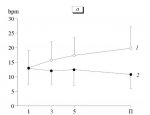- Messages
- 32
I've been strictly pacing below my anaerobic threshold and avoided crashing this year- until recently when I had nerve conductancy testing two weeks ago that's completely undid all my hard resting.
In PEM, a symptom from last year is again bothering me- high heart rates and breathlessness when eating or drinking. Difficulties swallowing can be an issue due to swollen glands, sinus congestion, muscle weakness, stress etc. In these instances it occurs even when I swallow easily.
I documented this yesterday (68-92 bpm, laying reclined)
Today sitting knees up in a crouch position, resting 59 went up to 94bpm. (raised 36bpm).
Both times I am laying or sitting still in a relaxed position and using a straw to drink.
Normally, my heart rate goes up to approx 72-74bpm on the first swallow and stabilises around that level, as is normal as part of the 'cardiac chronotropic response': https://www.ncbi.nlm.nih.gov/pubmed/12910298
The sympathetic chronotropic response causes the heart rate to raise with swallowing, approx 8 beats.
supine position (13.1 +/- 5.6 bpm)
standing position (8.5 +/- 3.8 bpm).
Assuming these are standard deviations, in their normal population 95% of people's HR raised:
laying flat 2-24bpm
Standing 1- 16bpm
According to the study abstract, the parasympathetic nervous system slows heart rate through the action of the vagus nerve. I don't have access to the full study so haven't been able to get further details.
The response relies on the vagus nerve, which may be lacking tone, or inflamed? in ME/CFS/fibro. Thus in PEM there is sympathetic dominance, the HR isn't slowed by the parasympathetic response, the parsympathetic response may not occur and the heart rate may continue to elevate beyond the third swallow. I'm assuming its inflammation because if it just 'lacked tone' wouldnt this occur all the time and not just in PEM?
This seems to be readily documentable evidence of vagus nerve problems, specific to PEM, but I haven't seen mention in the literature.
Thoughts? Experiences? Studies?
In PEM, a symptom from last year is again bothering me- high heart rates and breathlessness when eating or drinking. Difficulties swallowing can be an issue due to swollen glands, sinus congestion, muscle weakness, stress etc. In these instances it occurs even when I swallow easily.
I documented this yesterday (68-92 bpm, laying reclined)
Today sitting knees up in a crouch position, resting 59 went up to 94bpm. (raised 36bpm).
Both times I am laying or sitting still in a relaxed position and using a straw to drink.
Normally, my heart rate goes up to approx 72-74bpm on the first swallow and stabilises around that level, as is normal as part of the 'cardiac chronotropic response': https://www.ncbi.nlm.nih.gov/pubmed/12910298
The sympathetic chronotropic response causes the heart rate to raise with swallowing, approx 8 beats.
supine position (13.1 +/- 5.6 bpm)
standing position (8.5 +/- 3.8 bpm).
Assuming these are standard deviations, in their normal population 95% of people's HR raised:
laying flat 2-24bpm
Standing 1- 16bpm
According to the study abstract, the parasympathetic nervous system slows heart rate through the action of the vagus nerve. I don't have access to the full study so haven't been able to get further details.
The response relies on the vagus nerve, which may be lacking tone, or inflamed? in ME/CFS/fibro. Thus in PEM there is sympathetic dominance, the HR isn't slowed by the parasympathetic response, the parsympathetic response may not occur and the heart rate may continue to elevate beyond the third swallow. I'm assuming its inflammation because if it just 'lacked tone' wouldnt this occur all the time and not just in PEM?
This seems to be readily documentable evidence of vagus nerve problems, specific to PEM, but I haven't seen mention in the literature.
Thoughts? Experiences? Studies?

